Thailand News Today | Backlash over sloppy happy plant guidelines

The opposition will be going after the government for its botched happy plant decriminalisation and legalisation laws. Or, specifically, their lack of details and the loose ends left dangling for Thais and foreigners to navigate.
Politics aside, the June 9 announcements about the C plant in Thailand were broadly misinterpreted to be a blanket legalisation of the plant and all of its derivatives. The actual details and legislation haven’t even been tabled in parliament for debate, so the opposition is now targeting the government over its botched announcements on, what some believe, is a crucial societal issue that requires a proper debate.
The opposition parties, led by Pheu Thai and Move Forward, will likely focus on hot issues like underage addiction, school kids and drugs, illicit drug use in Thailand, perils of long-term use, dangers to society, among a myriad of topics.
The topic also brings additional focus to the deputy PM and public health minister, Anutin Charnvirakul, whose Bhumjaithai party has championed the changes to Thailand’s treatment of the plant as a Category 5 drug.
The PM and his conservative government, without any finalised legislation to point to at this stage, will be forced into backing Anutin and his party’s sweeping changes to Thailand’s generally conservative approach to drugs in the past.
The opposition will hammer the co-alition on their lack of legislative preparation, health advice, warnings, guides or restrictions.
The censure debates are scheduled for July 12 – 15.
————–
Bangkok governor Chadchart Sittipunt admits he fears for the health and safety of Thailand’s children after the decriminalisation of the C plant on June 9. He fears the lack of guidelines and accompanying legislation has led to confusion and incorrect assumptions following the announcement.
The 56 year old voiced his concerns at Wichutit School in Bangkok’s Din Daeng district while promoting a project to procure safety helmets for young students.
Chadchart says he has asked schools to make children aware of the potential harmful effects of the plants by producing pamphlets and hanging up posters. The city chief also urged local businesses near schools to join a crusade to steer children away from plants with happy properties.
The governor said the decriminalisation of the plants, which are now widely available, could harm students. He acknowledged he was aware Wichutit School is adjacent to Prachasongkroh Road where several shops sell happy plants and says it is a concern whilst there has been no follow up legislation from the Thai government.
On a separate issue, Chadchart says he is concerned about the number of children travelling to school on motorcycles without a helmet.
He revealed a survey that showed that 70% of the 270,000 young students attending schools within the Bangkok Metropolitan Administration do not wear helmets on motorcycles and he wants to change that. And Bangkok is a lot further ahead in the wearing of bike helmets when compared to other provinces in Thailand where a bike helmet is a rare sight on young students.
—————-
As you’ve probably heard from Jay and Natty this morning, the wearing of face masks is officially voluntary in outdoor areas, as per the latest edict published in the Royal Gazette.
It states: “The wearing of a mask is a voluntary practice from now onwards so that people can now live closer to normal conditions. The Ministry of Public Health only recommends that the general public wear a mask when living with other people in a crowded place, in areas where there is a large gathering of people where they can’t maintain social distancing, or in a poorly ventilated place, to reduce the risk of transmission of infection.”
Reading between the lines of the latest announcement on masks, you can walk around the streets and public spaces, but still need to wear one, say, when hopping on public transport. While the official announcement raises plenty more questions, the real-life result should be that we will see fewer people walking around the streets of Thailand with face masks.
Just how quickly Thais and expats reverse their 2 year and 2 month habit is yet to be seen. Many speculate that, just like in Singapore, there will still be a core of residents who will just keep wearing masks in public places for the foreseeable future.
Private businesses and organisations will also be able to apply their own mask-wearing rules.
It is also likely that all Thai government offices and schools will continue with a mask-wearing policy at this time.
The announcement is already in effect.
————
Now that several Covid-19 restrictions are easing in Thailand, the country’s employment rate is expected to spike this year.
The managing director of the job search platform, JobsDB, said the platform expects Thailand’s employment rate to jump by 20-50%, depending on the sector.
The platform conducted a survey on job applications last year. The career fields that received the most applications were sales, customer service, and business development, with 14% of people applying to jobs in these fields. Next, 11% of people applied to jobs in marketing and public relations.
But the field with the highest demand for workers right now is the IT industry. JobsDB said that even though salaries in IT have increased, IT employers are having a tough time finding enough workers. IT companies are on the hunt for programmers, software developers, data scientists, and analysts, among others.
JobsDB managing director Duangporn Promon said that workers who have skills to support the ‘metaverse’ are especially wanted right now.
Duangporn said companies can do a better job at attracting new employees by offering hybrid work policies, and challenging work. She said that hybrid work policies will help companies avoid mass resignations. While the US and Singapore have adapted to remote work, Duangporn said big conglomerates in Thailand are working on this.
She added that with the world’s booming inflation, “business needs to seek more revenue to raise salaries for their employees to cope with higher costs”.
———-
Local authorities have banned vendors from operating on Na Jomtien Beach after they colonised a new stretch of the seaside resort in Pattaya to sell their products.
The authorities issued the directive following a conflict over the public spaces on the popular beach between local sellers in Pattaya and visitors.
In April, authorities added more sand to the seaside spot to make the beach 800 metres’ longer. The new space was created for tourists to enjoy but merchants, local businesses, and hawkers quickly moved onto the area setting up stalls, tables, and chairs, denying any access to people wanting to use the sandy area.
Tourists complained to Pattaya authorities that local vendors parked their food carts at the parking area along the beach, and blocked them from accessing the beach and parking. The merchants’ carts also caused huge traffic problems on the road.
The dispute between vendors and visitors culminated at a meeting yesterday.
Five local government organisations agreed local vendors had set up their shops without permission. They took over public spaces for their benefit and caused many issues like trash problems, conflicts among sellers themselves, and traffic jams.
The meeting concluded by declaring a by-law banning all businesses from reserving spaces on the beach, sidewalks, and roads, to operate for personal benefits. The law comes into effect on Monday, June 27.
The cooking of food, selling food or products, parking food carts, or setting up shops on roads, sidewalks, and public spaces violate the Public Cleanliness Act. People who break these restrictions could face a fine of up to 2,000 baht.
Latest Thailand News
Follow The Thaiger on Google News:


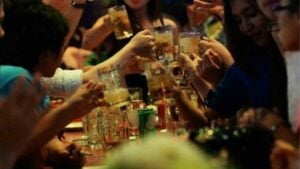






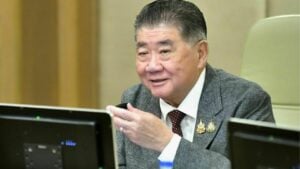




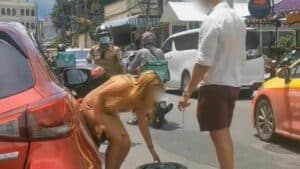
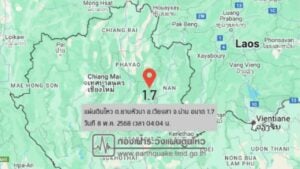
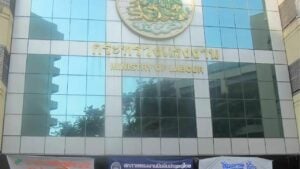
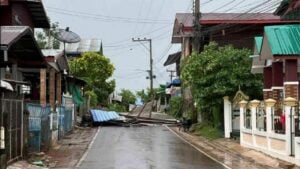
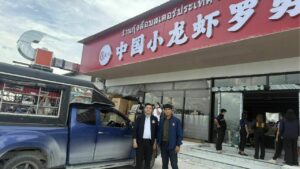








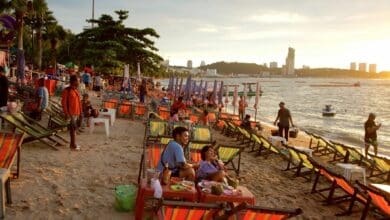
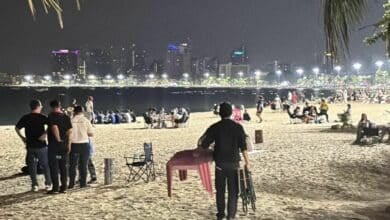
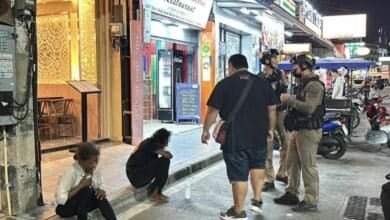
![Best weed shops in Thonglor [2025] | Thaiger](https://thethaiger.com/wp-content/uploads/2025/04/Guide-Article-Template-9-390x220.jpg)
![Best weed shops in Thonglor [2025] | Thaiger](https://thethaiger.com/wp-content/uploads/2025/04/Guide-Article-Template-9-220x150.jpg)
